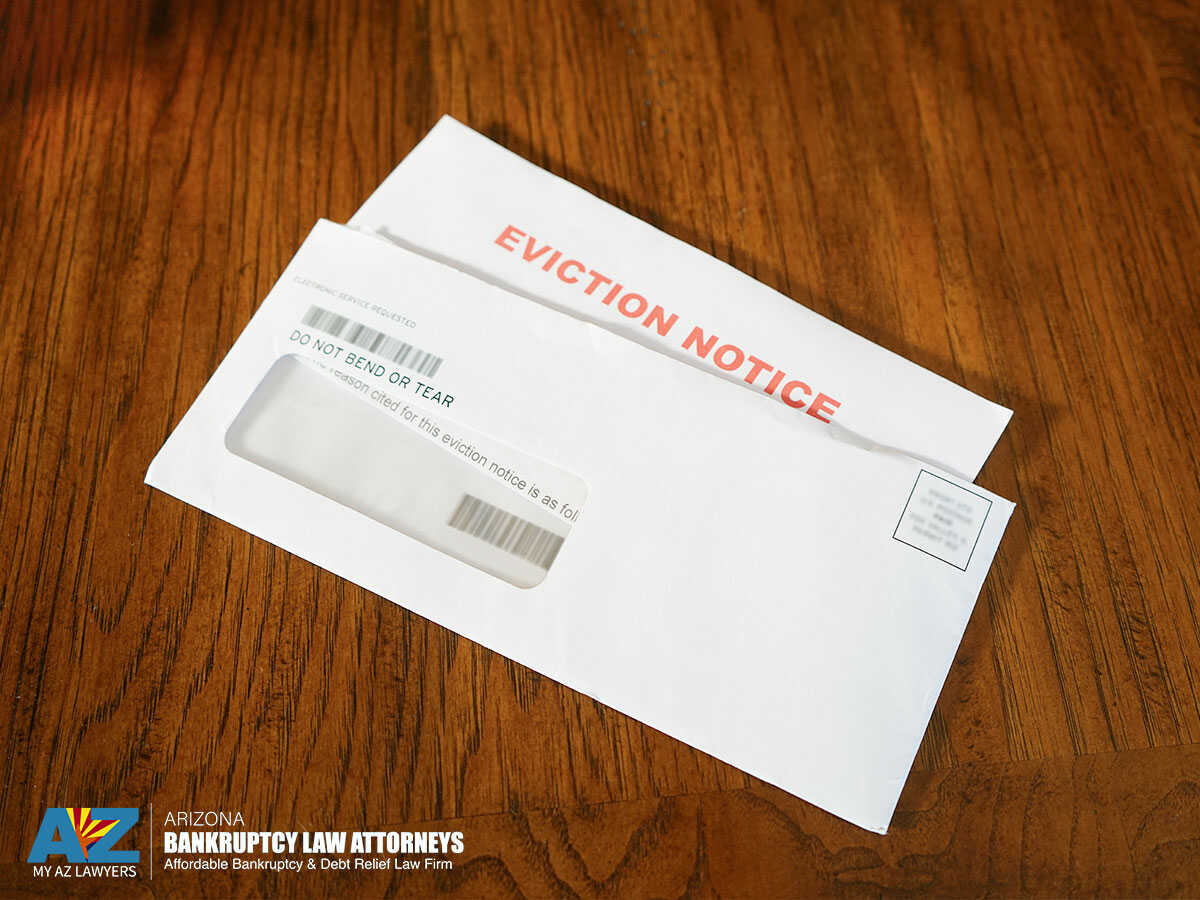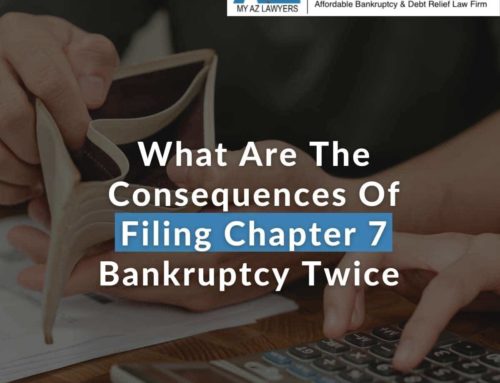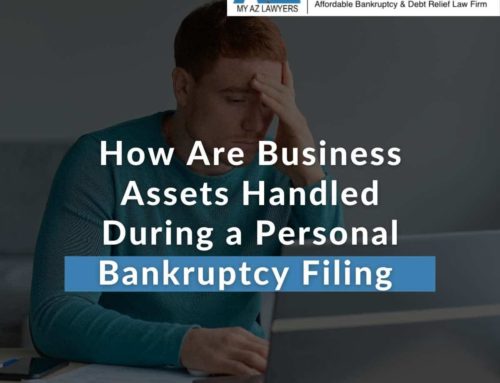Eviction & Filing Bankruptcy
When Can a Bankruptcy Filing Help You Out With An Eviction?
Eviction and bankruptcy can be tangentially related legal proceedings. In an eviction, a landlord forces a tenant to move out for a variety of reasons. A bankruptcy eliminates debts in a way approved and overseen by the court. Someone with unmanageable debt may struggle to pay rent, and someone who is evicted may see their debts suddenly accumulate.
During the initial onset of the coronavirus pandemic, there were several protections put in place to safeguard Americans. One of the efforts initiated by the Coronavirus Aid, Relief and Economic Security (CARES) Act were eviction moratoriums. When an eviction moratorium is active, tenants can’t be evicted for nonpayment of rent. Eviction moratoriums were a vital part of the CARES Act because with unemployment rates skyrocketing, there could have been millions of evictions across the United States. Evicted tenants being forced to move into crowded living situations or on the streets would also increase the spread of Covid-19. Eviction moratoriums aren’t absolute- tenants can still be evicted for reasons besides nonpayment of rent. For example, if a tenant is constantly throwing loud parties and getting into disputes with neighbors, the tenant can still be evicted for lease violations despite the active eviction moratorium.

Evictions In The Phoenix Area
Despite CARES Act protections, Phoenix had more evictions during the pandemic so far than any other city in the United States. There were 16,685 evictions in the Phoenix metropolitan area during the coronavirus pandemic. Only Houston followed close behind, with 16,563 eviction cases. Memphis was third in the country for pandemic evictions, with 8,792 eviction filings.
Phoenix typically has high eviction numbers, but this is particularly relevant during a pandemic. Typically, the most common causes of action for evictions are nonpayment of rent and lease violations. Nonpayment of rent isn’t available as an eviction cause of action during an eviction moratorium.
So are there that many people in Phoenix violating their leases? Or do landlords coincidentally start to care about certain lease violations only when the tenants fall behind on rent? Phoenix’s high eviction rate also reflects on skyrocketing rent prices in the area. Employment dropped about 8% in Arizona during the pandemic, a fact that may be indirectly related to the rise in lease violation evictions during that time.
Despite having the highest eviction rate in the country, the number of eviction filings in Phoenix actually decreased during the pandemic. There were 37,749 total eviction filings in Maricopa County in 2020. In 2019, Maricopa County had 68,719 eviction filings. That is a decrease of 45% during the pandemic.
Pandemic Eviction Moratoriums In Maricopa County
The first eviction moratorium was set to expire in Phoenix in July 2020. Governor Doug Ducey later extended the eviction moratorium through October 31, 2020. The Centers for Disease Control, or CDC, set its own eviction ban starting on September 4, 2020. This moratorium banned evictions for nonpayment of rent for tenants who lost income during the pandemic, and made good faith efforts to pay rent and apply for rental help. Subsequent eviction moratoriums banned evictions until December 31, 2020, then January 31, 2021. The CDC eviction moratorium is currently extended through March 31, 2021. Lawmakers are legislating additional pandemic relief efforts, which may extend eviction moratoriums even further.
How Can Bankruptcy Help Someone Facing Eviction?
The two most common forms of consumer bankruptcy are Chapter 7 and Chapter 13. When someone files a petition under either of these, they instantly gain the protections of the Automatic Stay. The Automatic Stay freezes the debtor’s assets and halts creditor collection. It is commonly utilized in bankruptcy to stop impending foreclosures, vehicle repossessions, wage garnishments, and bank levies. The Automatic Stay can also stop an eviction, depending on how far it has progressed.
The eviction process starts when the landlord has you served with a notice. The type of notice will vary based on your landlord’s cause of action for the eviction. You may have 60 days to move, or you may only have a few days to pay rent, cease a lease violation, or move out. If you fail to comply with the notice in the allotted time frame, your landlord can file the eviction in court. If you respond to the summons in time, you will have a short amount of time to develop a defense against the eviction. Plus, if that defense is unsuccessful, your landlord will secure an eviction judgment against you. Your landlord can secure an eviction judgment even faster if you fail to respond to the summons, or default. The Automatic Stay can halt an eviction at any point until the landlord has secured the eviction judgment against you.
Assuming you are being evicted for nonpayment of rent, Chapter 13 can be used to catch up on your back rent payments. However, Chapter 13 lasts 3-5 years, which is a long commitment for a rental lease. If you use Chapter 7 to avoid eviction, you will only have the length of your case, typically 4-6 months, to catch up on rent or move out. Otherwise, you can use bankruptcy to surrender a lease you can’t afford without extra fees or an eviction on your record. The rest of your unsecured debts are also discharged, so you can move forward with less of your income going towards monthly payments and interest.
Facing An Eviction Or Behind On Rent? Contact Our Experienced Debt Relief Team In Arizona Today!
Millions of Americans have faced months of financial struggles due to the coronavirus pandemic. If you are accruing debts and find it difficult to make rent, you are far from alone. You should feel comfortable discussing your debt relief options with an experienced professional. Our dedicated bankruptcy staff and attorneys work to reduce your stress and increase your confidence every step of the way. This kind of service is surprisingly within reach for many people’s budgets.
Our Mesa bankruptcy lawyers are available for free phone consultations as soon as the same day. This allows you to confirm your eligibility for bankruptcy, as well as learn about the advantages and drawbacks of declaring bankruptcy, so your decision to file can be more informed. If you decide to retain, we will take your creditor calls, so you can prepare for your bankruptcy free from creditor harassment.
We Have a $0 Down Option To File Your Bankruptcy
While many firms will let you retain for $0 down, at My AZ Lawyers, your petition can also be filed for as little as $0 down! To learn more about your options, and the benefits of filing with our firm, call (480) 833-8000 to schedule your free consultation today. Our AZ Bankruptcy Law Firm offers Chapter 7 and Chapter 13 Bankruptcy Filings, Zero Down Bankruptcy Filings, Emergency Bankruptcy Filings, Medical Bankruptcy Filings, as well as emergent bankruptcies to stop: Wage Garnishment, Foreclosure, and Repossessions.
Mesa Bankruptcy Law Office
Mesa Bankruptcy Lawyers
4065 E University Dr #500
Mesa, AZ 85205
(480) 470-0005
Phoenix Bankruptcy Law Office
668 North 44th Street, Suite #300
Phoenix, AZ 85008
(480) 833-8000
Glendale Bankruptcy Law Office
My AZ Lawyers
20325 N. 51st Ave.
Suite #134
Glendale, AZ 85308
(623) 640-4945
Tucson Bankruptcy Law Office
My AZ Lawyers
2 East Congress St. Ste. 900
Tucson, AZ 85701
(520) 306-8729
Avondale Bankruptcy Law Office
My AZ Lawyers
12725 W. Indian School Rd.Suite E, #101
Avondale, AZ 85392
(623) 399-4222






